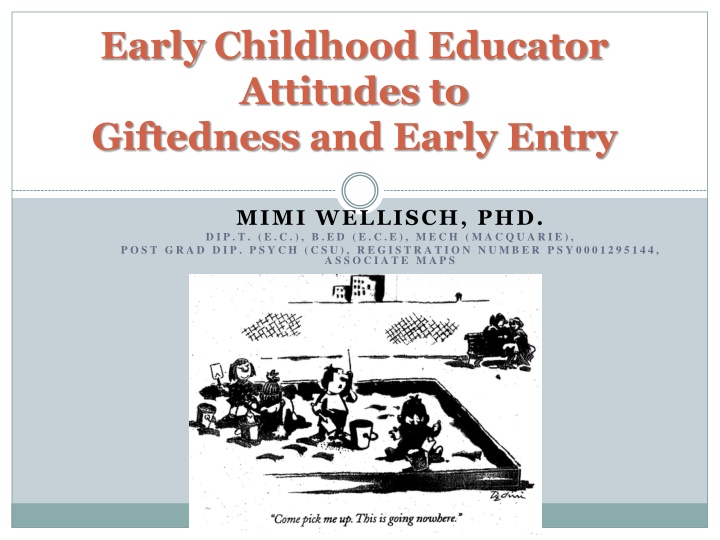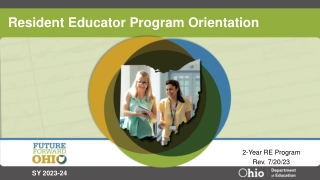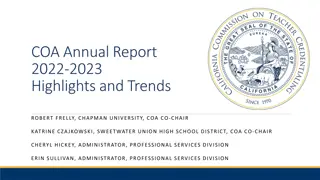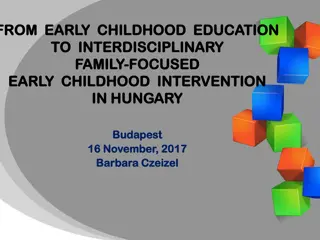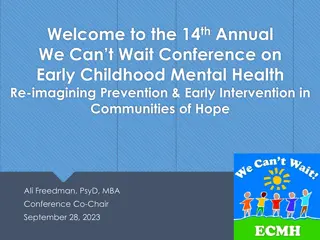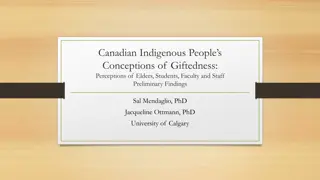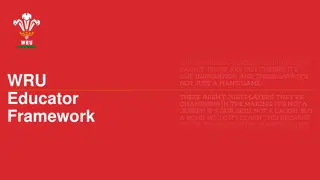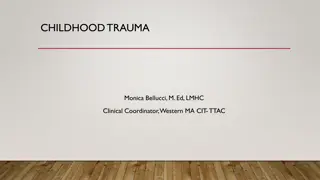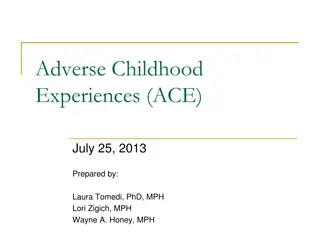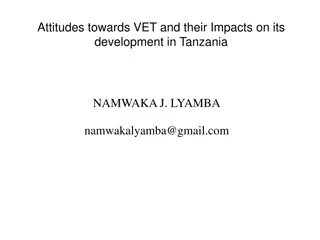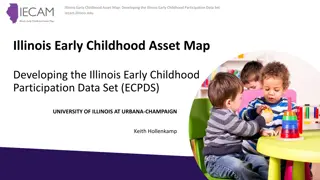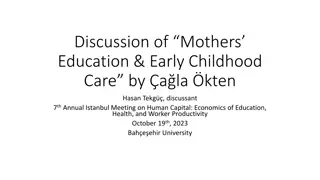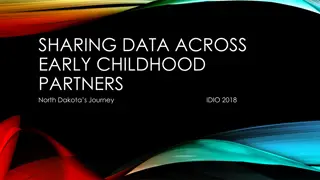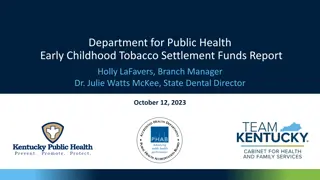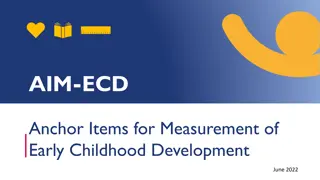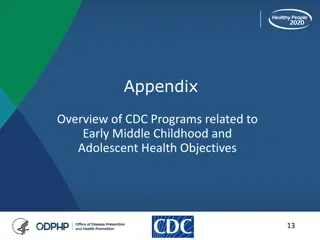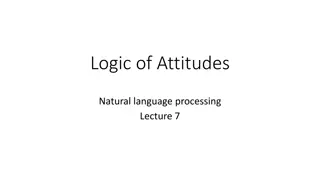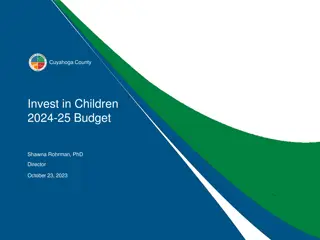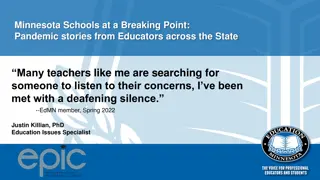Early Childhood Educator Attitudes to Giftedness Research Overview
Early Childhood Educator Attitudes to Giftedness and Early Entry research by Mimi Wellisch, PHD, explores the impact of gifted training on educator attitudes. It discusses the evolution of attitudes, training in giftedness, and regulation requirements for young gifted children in NSW. The research compares attitudes over 20 years, highlighting the need for increased awareness and confidence in recognizing giftedness in young children.
Download Presentation

Please find below an Image/Link to download the presentation.
The content on the website is provided AS IS for your information and personal use only. It may not be sold, licensed, or shared on other websites without obtaining consent from the author.If you encounter any issues during the download, it is possible that the publisher has removed the file from their server.
You are allowed to download the files provided on this website for personal or commercial use, subject to the condition that they are used lawfully. All files are the property of their respective owners.
The content on the website is provided AS IS for your information and personal use only. It may not be sold, licensed, or shared on other websites without obtaining consent from the author.
E N D
Presentation Transcript
Early Childhood Educator Attitudes to Giftedness and Early Entry MIMI WELLISCH, PHD. D I P . T . ( E . C . ) , B . E D ( E . C . E ) , M E C H ( M A C Q U A R I E ) , P O S T G R A D D I P . P S Y C H ( C S U ) , R E G I S T R A T I O N N U M B E R P S Y 0 0 0 1 2 9 5 1 4 4 , A S S O C I A T E M A P S
Todays presentation: The context: Gifted education in NSW university ECT courses, National Quality Standard, regulation requirements , funding for young gifted children, Early Entry The research: A 20 year comparison Impact of gifted training on educator attitudes Why the general change in attitudes and awareness? Giftedness and Early Entry: Facts and themes Summary and Recommendations
Early Childhood undergraduate information about giftedness at NSW universities. once I began to know more about [giftedness] a whole new way of looking at life and looking at children opened up that I had not been exposed to at all, not across one single day, in my early childhood degree in five years at Macquarie Uni (EC4) University Yes No No Response 1 Australian Catholic University Charles Sturt University Macquarie University Southern Cross University University of Newcastle University of New England University of Notre Dame University of Sydney University of Western Sydney University of Wollongong 2 3 4 5 6 7 8 9 ? 10 TAFE Bachelor Degree
Regulation and/or standard requirements for young gifted children in early childhood services Regulation Requirement Guide to the National Quality Standards 2016 ECA statement on inclusion
Funding General aim: to address participation barriers and include children with additional needs Preschool Disability Support Program (PDSP) for community based preschools in NSW Inclusion Support Programme (ISP) for Commonwealth funded early childhood services Neither mention children who are gifted
2017 research: Hypotheses 1. Rural educators more conservative 2. Sydney educators have more training opportunities 3. Educators with training in giftedness are more likely to: -feel confident in recognising giftedness in young children -recommend psychological testing for a child they suspected would be gifted -know about Early Entry -recommend Early Entry
Organisations and participants Educators were recruited through their association with: Community Child Care Co-operative (now Community Early Learning Australia) Country Children s Services Association of NSW Inc Early Childhood Australia, and KU Children s Services
Mixed methodology Quantitative/qualitative 32 question survey with yes/no, or true/not true answers. Some questions had an option to provide a comment. Collected via SurveyMonkey Qualitative Face-to-face recorded semi-structured interviews with 10 educators. Transcripts were transcribed.
Demographics A total of 184 respondents. 100% female Of these: 98 worked in the greater Sydney area 61 worked in rural and regional NSW 25 did not provide the location of their work
Areas of little change: Belief that educators can identify giftedness I can identify gifted child 80% 70% 67.24% 64% 60% 1997 2017 50% 40% 36% 32.76% 30% 20% 10% 0% Yes No
Improvements in Attitudes 1997: No interviewed participant (N = 8) implemented program for their gifted children 2017: Four interviewed participants (N =10) implementation of some type of differentiated program. No need for special program for gifted 80% 90% Children not gifted, parents pushy 80% 70% 76% 80.32% 70% 60% 58% 60% 50% 43% 50% 1997 2017 40% 42% 32% 40% 30% 30% 20% 20% 13.11% 10% 6.55% 10% 0% 0 0% Rural 1997 Rural 2017 City 2017 YES NO Don't Know
Older and more experienced educators benefit gifted children Current study: Educators with at least an Early Childhood Teacher qualification (N = 140) more likely to undertake or have undertaken training in gifted education (n = 44, 31%) than educators who did not have a degree (n = 5, 11%) Older experienced educators were also more likely to seek information about giftedness or undertake courses about giftedness 70.00% Length of time worked with 0-5s 35% 60.00% Educator qualification and exposure to gifted education 30% Gifted Training 50.00% 25% 40.00% 31% 20% No Gifted Training 15% 30.00% 10% 20.00% 11% 5% 10.00% 0% 0.00% ECTs or higher qualification Other educators under 20 years 20-30 years 30-40 years 40-50 years over 50 years
Hypothesis 1 Rural educators hold more conservative attitudes about gifted children than Sydney-based counterparts. Special needs child need more attention than gifted The notion of a gifted child is elitist 100.00% 100.00% 81.96% 80.00% 80.00% 86.88% 92.85% 73.46% 60.00% 60.00% Rural/regional Rural/regional 40.00% 40.00% Greater Sydney Greater Sydney 18.03% 17.34% 9.18% 20.00% 20.00% 5.10% 8.19% 4.91% 0.00% 0.00% YES NO YES NO Other Enough information re gifted during studies 90.00% 73.77% 80.00% 70.00% 84.69% 60.00% 50.00% 40.00% 26.22% 30.00% 15.30% YES 20.00% 10.00% NO 0.00%
Hypothesis 2 Sydney educators have more opportunities and are more likely to access courses on giftedness: 35.00% I have attended a course about gifted children 29.60% 30.00% 25.00% 23% 20.00% 15.00% 10.00% 5.00% 0.00% City Country
Hypothesis 3 Educators with some training in giftedness were more likely to: -feel confident in recognising giftedness in young children -recommend psychological testing for a child they suspected would be gifted -know about Early Entry -recommend Early Entry
2017: Difference when trained in gifted education cont d 2 (1; N=177) = 7.475, p = 0.006, Cramer s V = 0.205 90.00% I can identify a child who is gifted 80.00% 70.00% 82.60% 90.00% 60.00% All children are gifted 80.00% 50.00% Yes No 70.00% 55.70% 78.70% 40.00% 44.30% 60.00% 30.00% 50.00% 20.00% Yes No 56.20% 40.00% 10.00% 17.40% 43.80% 30.00% 0.00% Gifted Training No Gifted Training 20.00% 21.30% 10.00% 2 (1; N=177) = 10.52, p0.001, Cramer s V = 0.244 0.00% Gifted Training No Gifted Training
2017: Difference when trained in gifted education cont d 2 (1; N=182) = 11.98, p = <0.001, Cramer s V = 0.257 120.00% I have worked with gifted children 100.00% 95.80% 90.00% Recommended psychologist test for giftedness 80.00% 68.70% 80.00% 85.00% 60.00% Gifted Training 70.00% 60.00% 40.00% No Gifted Training 50.00% 19.40% 61.20% Yes No 20.00% 11.90% 40.00% 4.20% 0.00% 30.00% 0.00% 38.80% Yes No Don't know 20.00% 10.00% 15.00% 0.00% 2 (2; N=182) = 14.51, p = <.001, Cramer s V = 0.28 Gifted Training No Gifted Training
2017: Difference when trained in gifted education cont d 90.00% I have heard about Early Entry to school 80.00% 70.00% 83.70% 60.00% 50.00% Yes No 53.70% 40.00% 46.30% 30.00% 20.00% 16.30% 10.00% 0.00% Gifted Training No Gifted Training
Lack of information for parent referrals while the Preschool Disability Support Service exists to support children who have a disability, when you come across a child with giftedness, no one seems to know where to go to help this child many of the parents that I had worked with, they don t know where to go and particularly if you live West the only place I knew was GERRIC, that s it I don t know of anywhere that supports children or parents when they have gifted children (ECC5) With gifted children, I don t know where to go for information. I don t know who to access. And so, I will do my best, and I think it s possible, but I think I ve failed them (ECC1)
The National Quality Standard requirements Families are supported in their parenting role and their values and beliefs about childrearing are respected. Standard 6.2 The expertise of families is recognised and they share in decision making about their child s learning and wellbeing. Element 6.2.1 Current information is available to families about community services and resources to support parenting and family wellbeing. Element 6.2.2 The service collaborates with other organisations and service providers to enhance children s learning and wellbeing. Standard 6.3 Links with relevant community and support agencies are established and maintained. Element 6.3.1 Continuity of learning and transitions for each child are supported by sharing relevant information and clarifying responsibilities. Element 6.3.2 Access to inclusion and support assistance is facilitated. Element 6.3.3 The service builds relationships and engages with the local community. Element 6.3.4
Theme 1: Resistance to Early Entry Only nine (9; 5%) of respondents had recommended Early Entry to parents of a gifted preschooler Of these, five (5) had undertaken training in gifted children.
Sub-theme: Hold them back! (from school) we don t make any recommendations to hold them back, we leave it to the parents to make that decision. But yeah, certainly families who say I m going to go to this school, we say, yeah go. Have you considered that your child doesn t need to be at school till they are 6 (laughs). And you know we are very capable (ECC8)
Sub-theme:Early childhood services superior to what schools can offer (for gifted children) The teachers say this themselves, that they spend the first term getting to know the children and working out who are their behaviour problems. They spend the next, second third and fourth term dealing with the behaviour problems. But they then also say to me that the children equal out. I hate that thought (ECC6) Today s kids are like so pushed to learn more that their childhood age is like really short and they can t enjoy like their play (EC3).
Theme 2: EYLF* theoretically able to cater for young gifted children early childhood programs are focussed on open ended projects and so from my perspective if early learning centres are following that kind of pedagogy, then if the teachers, you know, are supporting the children at their own level, then really there should be no, no ceiling for those children and they should be catered for and their interests should be supported and facilitated. I just think it s difficult for them if they are there by themselves, I do think it is easier if there is an extra peer the same as them (EC4). 27% of rated early childhood services are still below the minimum ( Meeting ) Standard *Early Years Learning Framework
Sub-theme: No funding = inadequate planning Question: Have you ever done an Individual Education Plan for a gifted child? Yes well it s not, I guess it s not a formal document, but I do individualise their program and I document that (ECC1) essentially everyone has got an individual plan, but when you are required, because you are getting funding to do these extra pieces of paper, you do them.And it s time it s a bit more focussed a little bit more goal orientated where do we want to be by the end of the year? (ECC7)
Theme 3: School readiness = social readiness I don t think that entry into school is about academic work, it s about social-emotional development (EC6) School readiness should revelove [sic] around social development not cognitive achievments [sic](survey respondent) Generally gifted children have little inclination to interact with peers their own age, they need to learn social skills which is just as important as the academic skills (survey respondent, no gifted training]
Sub-theme: Confusion about gifted children s social [im]maturity it s very hard because you know you are talking about someone who has a more mature way of viewing the world having to socialise with those that have a less mature way of viewing the world (EC4) they re cognitively so advanced that parents think that they are going to get bored when they get to school yet socially and emotionally they are so immature (ECC5) what we wanted to try and work on was her social skills and her empathy with others, which was really difficult and we never ever really achieved it (EC6)
Positive 20-year change in attitudes about gifted children: The Media and Internet Question: So, do you think the media has played a part in your awareness? Yes, definitely That, and like seeing these children and wondering why then when I ve had children that have said to me this is it I would then look that up or google to find out a little bit more, but it was probably the media that s opened up that these children even exist (ECC1).
Summary IEPs are rare: funding unlikely and no legal requirements Little or no undergraduate information; despite this, more than 1/4 had some gifted training (1 hour or more)) EYLF should work , yet many unsure about how to plan for gifted preschoolers 2/3 had never heard about Early Entry Hold them back bias is wide spread Training in giftedness had significant impact on attitudes General increase in positive attitudes compared with 20 years ago due to media exposure and internet access
Recommendations 1. Universities must include compulsory education about gifted children and Early Entry in undergraduate early childhood studies 2. There needs to be increase number of PD courses about giftedness for all qualification levels of early childhood educators 3. AAEGT should advocate for clarity re funding for gifted children under additional needs provisions (including to funding agencies themselves) 4. AAEGT should produce and distribute a flyer to early childhood services about services available to gifted preschool children and their parents.
Thank you to the 188 survey respondents, the 10 interviewed educators who participated in the study, and to the following organisations: Community Child Care Co-operative Country Children s Services Association of NSW Inc Early Childhood Australia, and KU Children s Services -Thank you for your participation-
Any Questions? CONTACT: mimiwellisch@bigpond.com http://www.cleverkidsconsultancy.com This presentation has drawn on: Hodge, K. (2016). Gifted children in the preschool years: What do their educators believe and do. Unpublished paper. AAEGT National Gifted Conference, Beyond the Boundaries in Gifted Education. Kensington: University of NSW. Wellisch, M. (1997). A pilot study: Teacher views on the concept of giftedness in the early childhood settings.Australian Journal of Early Childhood, 22 (2), 22-28. Wellisch, M. (1999). Young gifted and talented children: Early childhood teacher attitudes and practices on the North Coast of NSW. Journal of Australian Research in Early childhood Education, 1, 131-140. and more
